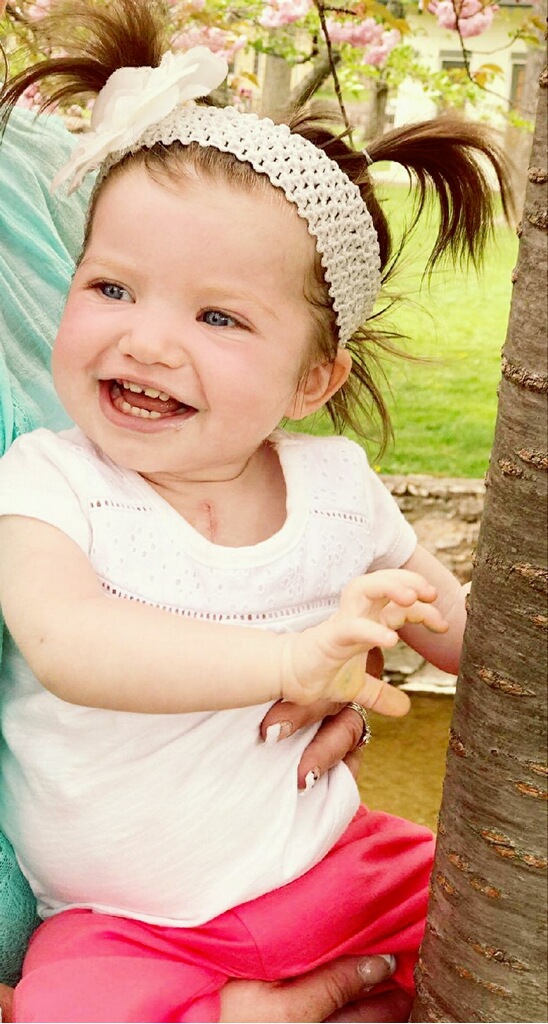WVU Medicine Children’s doctor implants tiny heart valve in child born with rare syndrome
Monday, May 1, 2017
MORGANTOWN, W.Va. – Emma Soustek, 14 months, of Berkeley Springs may look just like any other little girl, but she’s got a secret. Her heart beats with the help of a tiny mechanical valve that was implanted at WVU Medicine Children’s.
 Emma Soustek
Emma Soustek
Emma’s mother, Alexis Moore, had a normal pregnancy, and she and Anthony "Buddy" Soustek welcomed Emma on February 28, 2016. But two days later, just before Emma and Alexis were to be discharged from WVU Medicine Berkeley Medical Center, hospital staff discovered that the oxygen levels in Emma’s extremities were abnormal. The results of a subsequent echocardiogram revealed that Emma had coarctation of her aorta, which is a narrowing of the aorta. She was then flown to WVU Medicine Children’s.
After a six-day stay in the Neonatal Intensive Care Unit, Emma underwent her first open heart surgery, which was performed by Robert Gustafson, M.D., known by his patients and colleagues as “Dr. Gus.”
At home after discharge, Emma was thriving. She gained weight, and she started to crawl and roll over, just like normal babies do. But then, things took a turn. She stopped growing and started losing weight. She had no interest in eating and tired out easily. In addition, no matter what her core body temperature was, her hands and feet were always cold. It was then that she was diagnosed with mitral valve stenosis, a narrowing of the mitral valve.
The surgery to repair Emma’s mitral valve was scheduled for Jan. 10, 2017, but she developed pneumonia. It was rescheduled for Feb. 2, but she contracted roseola, a viral infection. On March 21, she finally underwent her second open heart surgery, this time to repair her mitral valve. The operation’s success was short lived. Emma went into heart failure and had to be put on a ventilator.
Prior to Emma’s second surgery, Fawwaz Shaw, M.D., pediatric cardiothoracic surgeon at WVU Medicine Children’s, suggested a plan B that included implanting a new mechanical valve into Emma’s heart. The 15-m.m. mechanical heart valve is so new that it is not yet available for commercial use. Fewer than two dozen have been implanted in the U.S. as part of a clinical trial, and a handful of others as part of a humanitarian device exemption from the U.S. Department of Health and Human Services. Emma fell into the latter category. Dr. Shaw handled the request and filed the paperwork. Emma was approved for the exemption.
With time and options running low, Shaw performed emergency surgery to implant the valve on March 27. To date, the valve replacement has been deemed a success.
“Now, because of the surgery, she’s not wanting to crawl. But, if I put my hands down, she’ll hold onto my hands and walk right along with me. She just won’t let go. She is getting strength back, and she’s getting more confident. She seems to me that she feels way better,” Alexis said. “I never really noticed how bad she felt because she was always happy before, but now that I see her like this, it’s amazing.”
Shaw explained that Emma was born with a rare congenital heart condition called Shone’s Syndrome. While the valve replacement is working now, Emma will undergo future surgeries, including those to replace the current valve as she outgrows it. In the meantime, she will return to WVU Medicine Children’s for close follow-up.
“The outstanding care provided by each of the components of our Pediatric Heart Program, including cardiac anesthesia, perfusion, critical care, cardiology, nursing, and our operating room team, is the primary reason that we are able to successfully bring the most current cardiac technologies to the children of West Virginia,” Shaw said. “We are thrilled with Emma’s short-term outcome and look forward to following her progress closely.”
“Every time I see Dr. Shaw, I just want to hug him. The team here has been absolutely amazing. They handled everything very professionally, they were very understanding, they comforted us, they laughed with us, they cried with us, they reassured us, and they did everything that they could to help us,” Alexis said. “Even though I’m scared, I’m pretty confident whenever she goes back there that she’s going to be OK because they do a great job. They treat the patients here like their own kids, and that’s very special to me.”
The family is so grateful for the care they received that they made a thank-you card before they left the hospital. The card now resides in the Pediatric Intensive Care Unit (PICU), where Emma spent more than three weeks after her most recent surgery.
“It was funny, the first day that she walked in the PICU after surgery, everybody was lined up clapping and cheering her on,” Alexis said. “We just got so much support from them, that was really amazing.”
For more information: Angela Jones-Knopf, Manager of Media Relations, 304-293-7087